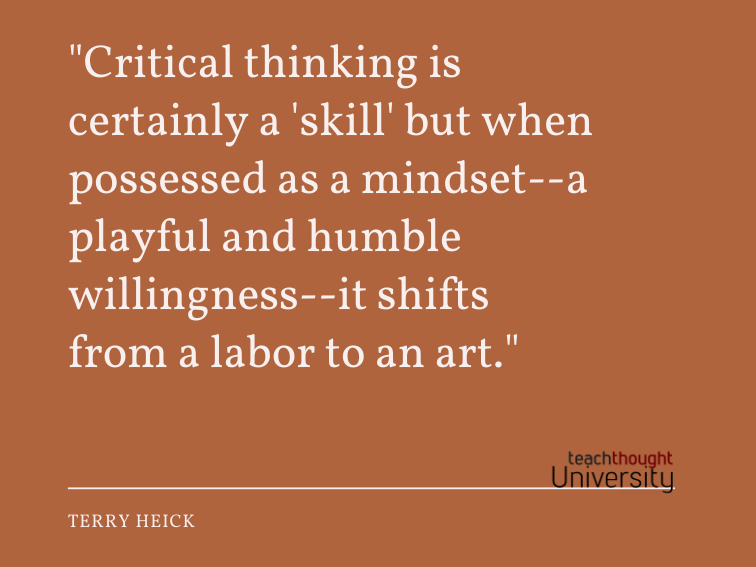

by Terry Heick
Every few months, I see a short article making the rounds that crucial thinking isn’t a skill and as a result can’t be instructed.
And since it’s likewise tough to determine and modern-day public education and learning is driven by measurement, as an idea it sort of beings in the corner, unconcerned and mute.
Often, these write-ups remain in concerns to a discussion or research study related to Daniel Willingham, a psycho therapist at the University of Virginia that is often associated with this sort of claim. Even though my instinct is to disagree, Willingham, naturally, recognizes more regarding this subject than I do so my objective below is not to dispute that claim.
I do, however, assume it’s possible that we may misinterpret what it suggests to think critically, which I’ve written about (though rarely or well sufficient) sometimes. In The Meaning Of Essential Thinking , for instance, I stated:
Essential thinking is among the initial reasons for change (individual and social) however is a pariah in colleges– for nothing else reason than it conditions the mind to believe the type and feature of everything it sees, including your class and every little thing being educated in it. Obviously, vital reasoning without knowledge is embarrassingly idle, like a farmer without an area. They need each various other– idea and knowledge. They can likewise vanish into one another as they work. When we have actually established that– that they’re different, capable of merging, and require one another– we can get at the marrow and worry of this whole point.
Terry Heick
After seeing the effect of disinformation on current national and international occasions, it has occurred to me that critical thinking is less of a skill and more of a desire or routine. Basically, important thinking is a state of mind. As I have actually stated prior to concerning analysis– here, for example, in Why Students Must Review — is that while it is very important that trainees can review, it’s more crucial that they do read.
And critical reasoning– thinking reasonably, with reason and evidence, humbleness and understanding, understanding and uncertainty– is comparable: it is essential that trainees can assume critically however it’s more crucial that they do assume critically.
In this way, important reasoning has to be a state of mind.
Critical Assuming Is A Frame Of Mind
Arstechnica (somewhat) just recently wrote about how set way of thinkings hurt believing in reviewing Why Can Just 24 % Solve Bayesian Thinking Problems in All-natural Regularities: Frequency Phobia in Spite of Possibility Loss Of Sight
Equally as math can be stated to be a kind of language and science is a mind-set, crucial thinking (while likewise being a ‘means’ of thinking) is first a mindset– a willingness to do so both preceded and proceeded by a motley collection of presuppositions and properties and tendencies and cognitive defaults and even at some point characteristic that materialize when you check out a publication or have a conversation or skim an information heading or research a concept.
Essential thinking is absolutely a ‘skill’ however when had as a way of thinking– a lively and humble determination– it changes from a labor to an art. It asks, ‘Is this true? By what requirement? Who would certainly disagree and why? What is the background of this problem or topic? What am I missing out on? What kinds of expertise am I missing out on to understand this much more carefully and just how can I acquire them?
Crucial thinking as a skill tries to recognize.
Vital reasoning as a way of thinking checks out and listens as a witness and is haunted by what it doesn’t recognize and can not comprehend and afterwards, from that beginning point, begins the process of factor– of being and coming to be rational
Vital reasoning isn’t psychological due to the fact that its identification isn’t wrapped up in an opinion or ‘idea’ and being ‘wrong’ is valuable due to the fact that it obtains us closer to being ‘right.’
Important thinking is virtually impossible to apply without some kind of bias yet, as a state of mind, it looks for its own biases (see the definition verification bias , for instance) as a security guard may look for unfamiliar people.
Vital thinking is slow to decide and may not ‘make a decision’ in all because it understands that in the face of new evidence, it has to think again. And again. And again.
And, as a frame of mind, it’s all right with the labor of all of it because it values reason more than favor with crowds; it favors precision over perceived accuracy and experiences any kind of circumstance dewy-eyed and simple and curious, seeking to comprehend and terrified to fatality of prejudice and incomplete expertise and rational fallacies and various other cognitive wrongdoings that might lead it astray.
See? Crucial thinking is an ability yet it’s likewise a propensity and characteristic and light-making device in darkness for many comes to be a state of mind– both a way of understanding and a means of being.
And this is all part of means teaching it as an ability– much like teach students exactly how to review rather than why– belongs to our challenge in education and learning. Customarily, we are asking the wrong inquiries.
Vital Thinking Is A State of mind